|
|
|
Sort Order |
|
|
|
Items / Page
|
|
|
|
|
|
|
| Srl | Item |
| 1 |
ID:
193483
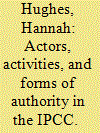

|
|
|
|
|
| Summary/Abstract |
Scholarship on global environmental assessments call for these organisations to become more reflexive to address challenges around participation, inclusivity of perspectives, and responsivity to the policy domains they inform. However, there has been less call for reflexivity in IPCC scholarship or closer examination of how routine concepts condition scholarly understanding by focusing on science and politics over other social dynamics. In this article, I suggest that scholarly reflexivity could advance new analytical approaches that provide practical insights for changing organisational structures. Through reflecting on my understanding of the IPCC, I develop actors, activities, and forms of authority as a new analytical framework for studying international organisations and knowledge bodies. Through its application, I describe the social order of the IPCC within and between the panel, the bureau, the technical support units, the secretariat and the authors, which is revealing of which actors, on the basis of what authority, have symbolic power over the writing of climate change. The fine-grained analysis of organisations enabled by this analytical framework reveals how dominance can and is being remade through intergovernmental relations and potentially, identifies avenues that managers of these bodies can pursue to challenge it.
|
|
|
|
|
|
|
|
|
|
|
|
|
|
|
|
| 2 |
ID:
140729
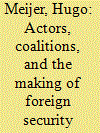

|
|
|
|
|
| Summary/Abstract |
In light of the intertwining logics of military competition and economic interdependence at play in Sino–American relations, this paper examines how the United States has balanced conflicting national security and economic interests in the making of US export control policy on defense-related technology toward China. Relying upon a large body of primary sources (including 170 interviews), it seeks to contribute to the understanding of this strategically sensitive yet neglected area of Sino–American relations. It is shown that, as a consequence of the erosion of the US capacity to control the diffusion of defense-related technology to China in the post-Cold War era, a growing set of actors within the United States has reassessed the security/economic calculus in Washington's relationship with Beijing. Specifically, this coalition advocates the streamlining of export controls to sustain the defense and technological industrial base and thereby maintain American military/technological preeminence vis-à-vis a rising China.
|
|
|
|
|
|
|
|
|
|
|
|
|
|
|
|
| 3 |
ID:
144772
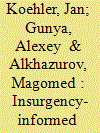

|
|
|
|
|
| Summary/Abstract |
In this article we analyse the dynamics of the insurgencies and the corresponding counter-insurgency measures in the North Caucasus over the past 25 years. By comparing three cases – Chechnya, Dagestan, and Kabardino-Balkaria – we identify similarities and differences in the way insurgencies and counter-insurgency measures influence governance in the region. Analysing different dynamics and outcomes under similar framework conditions – a federal state with a centralised government trying to govern a region with a shared history of rebellions against central rule and with similar geographic, social, and cultural features facilitating resistance and insurgencies – is a promising approach to better understanding conditions and implications of insurgency-induced governance in post-Soviet Russia.
|
|
|
|
|
|
|
|
|
|
|
|
|
|
|
|
| 4 |
ID:
106718
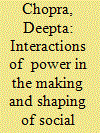

|
|
|
|
|
| Publication |
2011.
|
| Summary/Abstract |
This paper focuses on the interactions of power as analysed through the formulation story of a recently enacted social policy, the National Rural Employment Guarantee Act (NREGA), India. It explains the various drivers that led to the passing of this policy, with a view to analysing the extent and nature of power as was played out in the making of this policy. The paper sets out the way in which social policy formulation can be understood to be arising from interactions and linkages between individual actors, who together make up policy coalitions and networks. These interactions are described through a four-fold classification of processes (parliamentary, executive, party political and civil society) into which the actions and contributions of these actors feed, giving rise to an iterative, messy and complex reality. Power in the policy formulation network is shown as multi-sited as well as relational. The paper concludes with an endorsement for reconfiguring the geographies of power in the form of a kaleidoscope of actors and events, within and through which power flows and is exercised.
|
|
|
|
|
|
|
|
|
|
|
|
|
|
|
|
| 5 |
ID:
090987
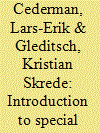

|
|
|
|
|
| Publication |
2009.
|
| Summary/Abstract |
We introduce the contributions to this special issue on "Disaggregating Civil War." We review the problems arising from excessive aggregation in studies of civil war, and outline how disaggregation promises to provide better insights into the causes and dynamics of civil wars, using the articles in this special issue as examples. We comment on the issue of the appropriate level of disaggregation, lessons learned from these articles, and issues for further research.
We introduce the contributions to this special issue on "Disaggregating Civil War." We review the problems arising from excessive aggregation in studies of civil war, and outline how disaggregation promises to provide better insights into the causes
|
|
|
|
|
|
|
|
|
|
|
|
|
|
|
|
| 6 |
ID:
128460
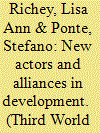

|
|
|
|
|
| Publication |
2014.
|
| Summary/Abstract |
New actors and alliances in development' brings together an interdisciplinary group of scholars exploring how development financing and interventions are being shaped by a wider and more complex platform of actors than usually considered in the existing literature. The contributors also trace a changing set of key relations and alliances in development - those between business and consumers; ngos and celebrities; philanthropic organisations and the state; diaspora groups and transnational advocacy networks; ruling elites and productive capitalists; and 'new donors' and developing country governments. Despite the diversity of these actors and alliances, several commonalities arise: they are often based on hybrid transnationalism and diffuse notions of development responsibility; rather than being new per se, they are newly being studied as practices that are now coming to be understood as 'development'; and they are limited in their ability to act as agents of development by their lack of accountability or pro-poor commitment. The articles in this collection point to images and representations as increasingly important in development 'branding' and suggest fruitful new ground for critical development studies.
|
|
|
|
|
|
|
|
|
|
|
|
|
|
|
|
| 7 |
ID:
127819
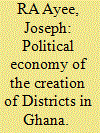

|
|
|
|
|
| Publication |
2013.
|
| Summary/Abstract |
There has been a flurry of publications examining Ghana's decentralization programme since 1988 to date. None has, however, specifically focused on the creation of districts; that is, the political and geographical division of the state into smaller jurisdictions - arguably regarded as one of the key processes of decentralization. In other words, the numerous studies do not fully explain the politics of the creation of districts, which has not only been a recurring phenomenon but also a contentious and sensitive one. This paper aims at filling this lacuna by identifying the actors and discussing their interests, benefits and the tensions arising from the creation of new districts in Ghana. The lessons learnt are also highlighted.
|
|
|
|
|
|
|
|
|
|
|
|
|
|
|
|
| 8 |
ID:
139600
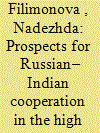

|
|
|
|
|
| Summary/Abstract |
The paper examines emerging prospects for Russia–India cooperation. While the two countries can collaborate in various areas of mutual interest, the paper identifies possible challenges and effects on the cooperation in the Arctic region. The sanctions imposed by the West could impede Russian energy projects in the Arctic. This could force the state to find a way to replace Western technologies through enhancing capacities of national industry and developing cooperation with other states, including Asian countries. This shift is also bolstered by the political interest to strengthen the position of Russia in the Asian region as a whole, and to increase the country's energy security. The paper provides an overview of the Russian and Indian interest and policy in the Arctic, and presents the perspectives and challenges for both countries.
|
|
|
|
|
|
|
|
|
|
|
|
|
|
|
|
| 9 |
ID:
117223
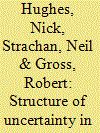

|
|
|
|
|
| Publication |
2013.
|
| Summary/Abstract |
Low carbon scenario and transition pathway analysis involves the consideration of uncertainties around future technological and social changes. This paper argues that uncertainty can be better understood, and the strategic and policy effectiveness of scenarios or pathways thereby improved, through a systematic categorisation of the different kinds of certain and uncertain elements of which the future is comprised. To achieve this, this paper makes two novel methodological contributions. First it proposes a system conceptualisation which is based on a detailed description of the dynamics of the actors and institutions relevant to the system under study, iteratively linked to a detailed representation of the technological system. Second, it argues that as a result of developing this actor-based low carbon scenarios approach it is possible to characterise future elements of the system as either pre-determined, actor contingent or non-actor contingent. An outline scenario approach is presented, based on these two contributions. It emerges that the different categories of future element are associated with different types of uncertainty and each prompt different strategic policy responses. This categorisation of future elements therefore clarifies the relationship of scenario content to specific types of policy response, and thus improves the policy tractability of resulting scenarios.
|
|
|
|
|
|
|
|
|
|
|
|
|
|
|
|
| 10 |
ID:
108241
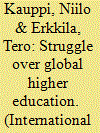

|
|
|
|
|
| Publication |
2011.
|
| Summary/Abstract |
This article examines the intensification, since the creation of the so-called Shanghai list of world universities in June 2003, of a political struggle in which a variety of actors, universities, national governments, and, more recently, supranational institutions have sought to define global higher education. This competition over global higher education has highlighted issues such as the internationalization and denationalization of higher education, the international mobility of students, the role of English language as the language of science, and the privatization of higher education. In contrast to IPE or Marxist analyses, we analyze the symbolic logic of ranking lists in higher education, their uses, and the European Commission's initiative to create an alternative world university classification (see World Social Science Report, UNESCO Publishing; Europa zwischen Fiktion und Realpolitik/L'Europe-Fictions et réalités politiques, Transcript for analysis). This initiative represents a political move in a process of rapid restructuration of higher education at the global level.
|
|
|
|
|
|
|
|
|
|
|
|
|
|
|
|
| 11 |
ID:
155666
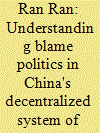

|
|
|
|
|
| Summary/Abstract |
Decentralized environmental governance theory suggests that decentralization can produce better environmental performance mainly because lower-level governments are closer to the people and environmental issues and are considered more legitimate than the national government. However, China's decentralized system of environmental governance has been often regarded as a key factor in creating pollution problems rather than in solving them. To explain this puzzle, this article, using Blame Avoidance Behaviour in government theory as a theoretical framework, examines how blame avoidance behaviour shapes China's decentralized system of environmental governance from three perspectives: first, actors and the chain of blame shaped by the hierarchical power structure among environmental policymakers and implementers; second, the strategies of discursive domination and decentralization for blaming environmental problems on local officials; and lastly, the contextual factor of “hierarchical governmental trust.” Drawing on documentary discursive analysis and extensive fieldwork, this article suggests that the dysfunction of China's decentralized environmental governance structure may in fact be an outcome of a blame-shifting game between central and local governments.
|
|
|
|
|
|
|
|
|
|
|
|
|
|
|
|
|
|
|
|
|